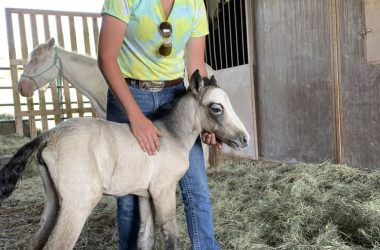MEEKER I Honey is something most of us take for granted. We slather it on toast or swirl it into our tea without a second thought. But to local producers, those amber-colored jars of goodness are more than a tasty condiment, they’re a way of life.
Claude Wood has been involved in the honey business for almost 60 years. He started working for his best friend’s dad, Ed Limbach, in his teens in the Colorado River Valley. Claude and Limbach’s son Paul remained friends through high school and were college roommates. Honey has been a part of their friendship ever since. Today Claude and his wife Peg maintain a handful of hives on their property east of Meeker and bottle and sell their honey locally.
Claude is at least as comfortable with his bees as most folks are with their dogs and cats, and maybe more so. He welcomed the HT (plus a couple kids) for an interview and site visit just prior to the Meeker Classic, where he and Peg will be on hand with educational information for kids and adults about bees and honey—a favorite every year—as well as honey for sale.
Upon arrival, the first thing one notices is the scent. Honey not only tastes sweet, it smells sweet, too, especially in the “honey house,” where the honey is extracted from the hive frames using centrifugal force to pull the honey from the combs.
The modern beekeeper’s hive was the brainchild of a 19th century minister named Lorenzo Langstroth. Langstroth patented the first movable beehive in 1852. The modern hive—visible all over rural Colorado—is made up of a base, a larger “super” on the bottom where the bees overwinter, a second large super for brooding; and then smaller supers the bees fill with honey. It’s those boxes that honey is extracted from.
The bees build honeycombs and fill the frames with honey, then seal each cell with wax much the way we seal homemade canned goods. When it’s time for extraction, the beekeeper uses a heated knife to cut off the wax seal. The frame is placed in a large vat, which uses centrifugal force to extract the honey, which trickles into five gallon buckets.
The Woods use the wax to create beeswax candles. When it’s time to decant, the Woods—in accordance with state law—use the commercial kitchen at Wendll’s to bottle the honey, after heating it and straining it through a nylon filter to remove impurities. Local honey, in particular, is prized for containing the additional pollen and micronutrients which is purported to help with seasonal allergies.
Large-scale commercial honey is heated to a higher temperature and filtered through porcelain, Wood explained, to give it a longer “shelf life” before it crystallizes, making it harder to sell.
From the honey house, we traveled to the hives, housed at the corner of a field not far from the house. After donning bee veils—bees identify human hair as a threat, so the veils help disguise the human presence—we watched as Claude “smoked” the bees with cedar bark smoke. Smoke calms the bees, he explained, although bees in honey production season usually aren’t very “cranky” anyway.
The longer we remained, and the more frames Wood pulled out to show us the eggs and larvae, the more active the bees became.
During their brief lifespan, honeybees fulfill various “careers,” Wood explained. They take care of the “nursery” cells, do housekeeping, guard the hive entrance, and eventually get “promoted” to field bee status. Field bees go out in search of pollen, and keep flying “until their wings wear out.”
Bees that hatch in the fall are called “fat bees” and are literally fatter than their counterparts to help them survive the winter. Male drones serve one purpose, and only when needed: mating with a new queen. The queen, by contrast, lives three to four years, producing up to 1,000 eggs a day. Attendant bees feed her, clean her, and direct her to open cells to lay eggs. Other than the drones, which are male, and the queen, all the bees in a hive are sterile females. Queens are only produced when needed, as well, thanks to being fed “royal jelly.” In the bee world, “you are what you eat” holds true literally.
Beekeepers feed their hives throughout the winter, making sure they have enough food to survive. When the weather gets cold, Wood said, the bees circle around the queen, producing enough heat from their bodies to keep the hive at a comfortable temperature. While some producers use sugar water, Wood prefers to keep back a portion of the year’s honey harvest to sustain his hives. In the spring—once the dandelions bloom, the apiarist (beekeeper) breathes a sigh of relief—the bees have food again, although Wood said they don’t keep dandelion honey as it has a strong flavor people don’t usually like. Alfalfa, clover and other flowering plants make up the majority of the bees’ diet.
A full hive contains tens of thousands of bees. The longer we peered and poked into the hive, the more bees came out to see what was going on, landing on hands and feet and arms and bee veils.
Each bee produces up to a teaspoon of honey in its lifetime. Honey is the primary product, but not the only item they produce that can be sold: honey, beeswax, pollen and bee propolis are all collected. Bee pollen—in yellow, orange and purple, depending on which flowers the bees have visited—filled a drawer between the entrance to the hive and the bottom super. A screen scrapes the collected pollen off the bee’s hind legs.
The bees make propolis to seal the hive—the way we would use caulk to seal off a draft—and thus create a sterile environment. Wood said propolis has worked for him as a way to ward off colds and other viruses. Propolis is highly prized for its health benefits.
Beeswax is used in multiple applications, from candles to crayons and more, though candles are probably the best known and most popular use.
Langstroth’s beekeeping system allows apiarists to relocate their hives to ideal locations, even moving hives across the country to support various crops. According to Wood, Limbach hauls some of his hives to California every year to help pollinate the almond orchards, and then brings the hives back to Colorado.
Bees have made national and international news lately, as some colonies have suffered catastrophic declines. Wood said Western Colorado has thus far avoided the “colony collapse disorder” problems seen primarily in the midwest. Those problems are believed to be the result of years of herbicide and pesticide spraying that are now affecting bee colonies, as the toxins in the ground make their way into the plants and flowers.
Healthy bees are a reflection of a healthy ecosystem, according to Wood. “The health of the hive is an indicator of the health of the environment,” he said. When the bees are healthy, the environment is healthy. When the bees are struggling, something is awry on a larger scale.
On that note, Wood supports the efforts of hobby beekeepers maintaining a hive or two, as “every little bit helps.”
To learn more about bees, visit the Woods’ honey booth at the Meeker Classic Sheepdog Championship Trials this week, where they’ll be selling their local honey and educating the public about bees and beekeeping. Stop by to see their bees in action.




















